
|
Keywords: , Mars
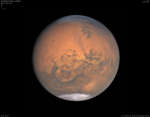 Close Mars
Close Mars
31.08.2018
Still bright in evening skies, Mars was just past opposition and closest to Earth on July 31, a mere 57.6 million kilometers away. Captured only a week later, this remarkable image shows...
 The Jellyfish and Mars
The Jellyfish and Mars
19.05.2021
Normally faint and elusive, the Jellyfish Nebula is caught in this alluring scene. In the telescopic field of view two bright yellowish stars, Mu and Eta Geminorum, stand just below and above the Jellyfish Nebula at the left. Cool red giants, they lie at the foot of the celestial twin.
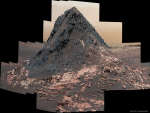 Ireson Hill on Mars
Ireson Hill on Mars
19.07.2017
What created this unusual hill on Mars? Its history has become a topic of research, but its shape and two-tone structure makes it one of the more unusual hills that the robotic Curiosity rover on Mars has rolled near. Dubbed Ireson Hill, the mound rises about 5 meters high and spans about 15 meters across.
 Global Aurora at Mars
Global Aurora at Mars
6.10.2017
A strong solar event last month triggered intense global aurora at Mars. Before (left) and during (right) the solar storm, these projections show the sudden increase in ultraviolet emission from martian aurora, more than 25 times brighter than auroral emission previously detected by the orbiting MAVEN spacecraft.
 The Spiral North Pole of Mars
The Spiral North Pole of Mars
19.12.2017
Why is there a spiral around the North Pole of Mars? Each winter this pole develops a new outer layer about one meter thick composed of carbon dioxide frozen out of the thin Martian atmosphere. This fresh layer is deposited on a water-ice layer that exists year round.
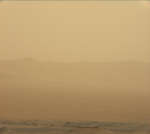 Dusty With a Chance of Dust
Dusty With a Chance of Dust
16.06.2018
It's storm season on Mars. Dusty with a chance of dust is the weather report for Gale crater as a recent planet-scale dust storm rages. On June 10 looking toward the east-northeast crater rim, the Curiosity rover's Mastcam captured this image of its local conditions so far.
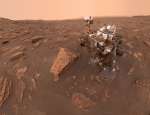 Curiosity s Dusty Self
Curiosity s Dusty Self
23.06.2018
Winds on Mars can't actually blow spacecraft over. But in the low gravity, martian winds can loft fine dust particles in planet-wide storms, like the dust storm now raging on the Red Planet.
 APOD: 2023 April 4 Б Olympus Mons: Largest Volcano in the Solar System
APOD: 2023 April 4 Б Olympus Mons: Largest Volcano in the Solar System
4.04.2023
The largest volcano in our Solar System is on Mars. Although three times higher than Earth's Mount Everest, Olympus Mons will not be difficult for humans to climb because of the volcano's shallow slopes and Mars' low gravity.
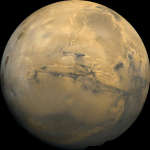 Valles Marineris: The Grand Canyon of Mars
Valles Marineris: The Grand Canyon of Mars
11.05.2014
The largest canyon in the Solar System cuts a wide swath across the face of Mars. Named Valles Marineris, the grand valley extends over 3,000 kilometers long, spans as much as 600 kilometers across, and delves as much as 8 kilometers deep.
 Stereo Mars
Stereo Mars
3.12.2022
Mars looks sharp in these two rooftop telescope views captured in late November from Singapore, planet Earth. At the time, Mars was about 82 million kilometers from Singapore and approaching its opposition, opposite the Sun in planet Earth's sky on December 8.
|
January February March April May June July August September October November |
|||||||||||||||||||||||||||||||||||||||||||||||||